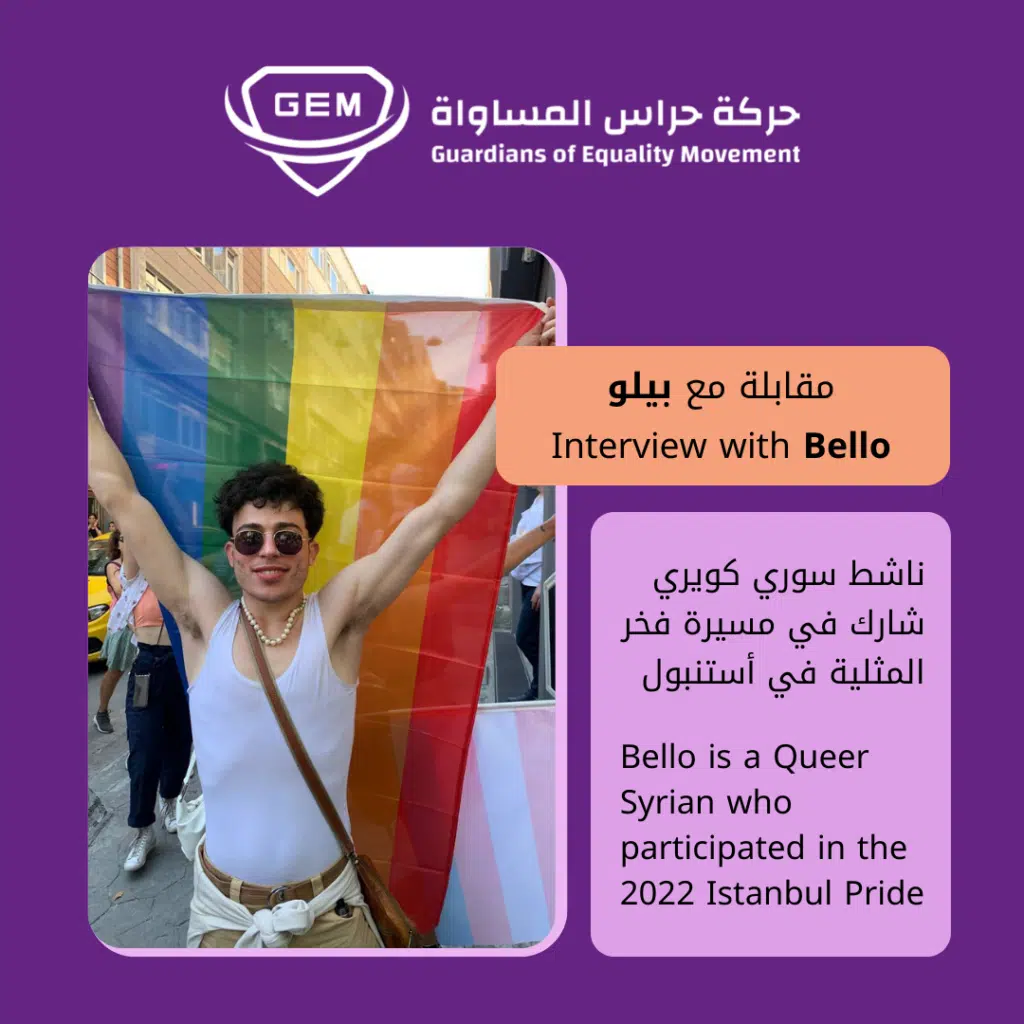Pride marches are an opportunity for LGBTQIA+ communities to confront legislation/laws that oppose their human rights. However, they are often met with discrimination and abuse, particularly by authorties in countries that actively work against the execution of these events.
Bello lives in Istanbul and tells us about what he experienced during his last pride walk:
“This was not my first participation in a pride march, as I participated in all the previous (Istanbul) pride marches from 2019 until 2022. This year’s march proved to me that rejection, hatred, and an intolerance of LGBTQIA+ people is still present and perhaps more prevalent than in previous years.
I was in a fit of despair after crowds of security and police began to gather around us. I hoped that what happened would not happen. Police, security forces and Homophobic civilians began to pursue, beat, and insult us.
The parade began in light spirits, with bright lights all around illuminating the place, people gathering and chanting beautiful phrases, vibrant colors indicating the positivity and luster of life. All of which made me feel alive!
The storm however began to approach little by little, and by storm, I mean security and police forces who were angry with us, it was like a strong and terrifying storm that spoiled a sunny spring day.
The police arrested nearly 400 LGBTQIA+ people including myself; many more were beaten, kicked, and subject to all possible forms of violence, with no mercy and no empathy.
We were taken to police stations in Karaköy where we waited for two hours, they then took us to the hospital and asked us to do a forensic medical examination, this request was insulting and a violation of our humanity before anything else, but we were in no place to object. We waited for about three hours before being seen by the doctor who gave us looks of hatred and contempt without examining any of us.
After this we were taken to a place they call “home.” I don’t know exactly how long we stayed there, maybe 20 hours, during which we were treated so badly that we were even prevented from using the toilet. Luckily, we then met a group of lawyers affiliated with organizations that help LGBTQIA+ people, before we were to see some staff at the detention center
A few hours later, we were transferred to a local hospital, as the lawyers advised us to have a real medical examination in order to be released, after our examination we were set free, but under terrible psychological conditions. My experience at the Istanbul Pride 2022 was so different from previous years. This was not just an experience; this is an issue, and it was my duty to be there. I do not see the meaning of a person living without having a cause to defend and a goal to reach.
Moments of joy mixed with moments of fear, to generate moments of tenderness when I got to know the rest of the people who were detained with me on the same bus. Everyone was united with each other, and worried about each other. They spoke the common language between us (English) after I told them that I do not know Turkish well, they told me what to say as to not get into other problems because of my Syrian Identity. It was a valuable experience.
During the narration of his story, Bello recalls the situation experienced by LGBTQIA+ people in Syria; I was always afraid of being exposed by my family and my friends at school, I was living in an internal struggle of protecting myself from inferior looks, contempt, and the risk of physical harm as well. I hid my LGBTQIA+ identity, tried to suppress and change it so that I could have dignity and freedom, this was a high cost. At that time the false hope and dream of freedom was my only consolation.
I cannot compare my life in Syria with my life now in Turkey, there may be small differences, but this does not mean that I live in peace here.”
For Syrian LGBTQIA+ refugees like Bello the experience at Istanbul Pride 2022 was a reminder of the acute oppression faced by LGBTQIA+ communities in the MENA region, although Turkey is viewed as a more open and LGBTQIA+ friendly place, discrimination, hate, and violence is still engrained in culture and authority. The difference between the treatment of LGBTQIA+ in Turkey and in Syria is not that great. Although crimninalised in Syria, to be open and expressive about ones LGBTQIA+ identity in either place is a risk to health and wellbeing if not life.

